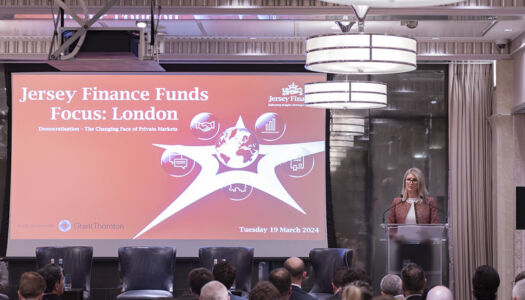Global Challenges Highlight the Value of ESG Analysis
At our Jersey Finance Private Wealth Conference 2022 on 27 September, thought leaders on subjects from geopolitics to sustainability set out what recent trends mean for private wealth advisers and their clients. Read a synopsis of the discussion below.

Lord Chris Patten, Chancellor of the University of Oxford, highlighted key recent events, transcending the geopolitical landscape. He suggested that increasing authoritarianism of China and Russia, a national-level governance concern, is manifesting into economic and financial damage.
“Ukraine is undoubtedly providing a headwind and the Chinese Communist Party’s concerns about globalisation, the internet and urbanisation led to two damaging responses”, he said, “that mean it will be ‘lucky’ to achieve 2.5% growth.”
The first response was a “crackdown on civil society”. The second was a clampdown on the private sector, focussed on the tech sector, despite it contributing the majority of tax, growth and innovation in China. Lord Patten intimated: “The rebalancing in favour of state-owned enterprises and cracking down on the private sector is very bad for China’s medium- and long-term prospects.”
Innovation in investing
A panel of experts discussed how the private wealth industry is innovating to accommodate differing generational attitudes towards asset allocation.
The next generation is more concerned about sustainability, according to Jordan Williams, Client Partner, Artorius. “It definitely wants to be more involved in the decision-making process. They are the custodians of family wealth and want to…get the right advice. ESG concerns are high on their agenda.”
Charlotte Thorne, Founding Partner of Capital Generation Partners, added: “The data, particularly on ESG, is beginning to cohere around useful themes.”
Rosie Bullard, Partner – Portfolio Manager, James Hambro & Partners, said she is thinking about how her advisory can adapt reporting and metrics so they become more valuable. “Every single client has different values and points that are important to them from a sustainability perspective.”
Risk mitigation in a transparent world
The second panel concentrated on risk mitigation, finding that Jersey’s international finance centre has maintained its position at the forefront thanks to the agile and adaptable structures available in Jersey for private wealth clients.
Dickon Johnstone, Chief Executive Officer, Themis, said: “Jersey is very much trusted as an international financial centre. It has a reputation for stability, good governance, good legal structures and expertise. One thing that Jersey does particularly well – which we don’t see in many other jurisdictions – is effectively using public-private partnerships (PPS).”
Matthew Braithwaite, Partner – Private Client, Wedlake Bell, added: “The progressive nature of Jersey Finance [means it has] a sustainability focus. I don’t think I’ve seen any other jurisdiction embracing the issues that it has done.”
Private wealth advisers also need to be aware of the reputational risks of dealing with clients from certain countries. “We’ve certainly seen a lot more political risks with the Russia situation,” said Emily Osborne, Partner, Stephenson Harwood. “It’s unprecedented to have such a high level of sanctions affecting, in some cases, anyone in Russia, as opposed to anyone linked to a regime.”
Building a sustainable future
Mary Portas, Chief Creative Officer of the Portas Agency and former UK government adviser, highlighted the importance of sustainability in the retail sector. “Sustainability isn’t a buzzword. It’s going to be our future – it has to be.”
Widespread consciousness of the problems caused by “heightened consumerism” means business models need to change, she said.
Designer brands – much like many financial services businesses – have become associated with a “distasteful way to live” and companies have entered a “completely new phase” based on integrity. “We have to come up with ideas that make the world a better place. It’s as simple as that.”




